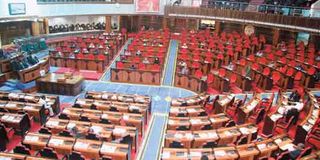MPs fault new budget plan

What you need to know:
The MPs also questioned the decision to term the Budget Framework and National Development Plan 2018/19--presented in Parliament on Tuesday by Finance minister Philip Mpango-- as new while there was much more from the past blueprints that remained unimplemented.
Dodoma. Members of Parliament on Wednesday warned that the government was likely to fail in its industrialisation drive because agriculture, infrastructure, electricity and health sectors have not been given priority in the next budget plan.
The MPs also questioned the decision to term the Budget Framework and National Development Plan 2018/19--presented in Parliament on Tuesday by Finance minister Philip Mpango-- as new while there was much more from the past blueprints that remained unimplemented.
The position of the opposition legislators was contradicted by their counterparts from the ruling party, CCM, who expressed their conviction that if implemented properly, the blueprint carries all that the country needs to achieve its industrialisation drive.
“Since President [John] Magufuli came to power, we have seen a lot of changes. He has done a lot to improve infrastructure as well as the provision of better education and health services, among others,” said Ms Hawa Ghasia (Mtwara Rural-CCM).
She cited the ongoing mega development projects and initiatives including construction of the standard gauge railway, and procurement of aircraft for the state-run Air Tanzania Company Limited as testimonies that the coming National Development Plan would be implemented seriously.
For her part, Ms Felista Bura (Special Seats-CCM) shared similar sentiments, noting however, that a focus on irrigation would give Tanzania’s economic growth endeavours a new push.
But in the views of MPs from the opposition bench, a meaningful development plan would have been one that puts more emphasis only on agriculture, infrastructure, electricity and heath sectors.
“It’s frustrating. When we were debating the 2016/17 budget, this Parliament endorsed money for several key development projects but most of them have never been implemented as planned due to delay by the government to disburse the funds. Today, we are planning a new plan, this is unacceptable,” argued Mr John Heche (Tarime Rural-Chadema).
He took a swipe at the government for demolishing people’s houses, prayer houses and other structures across the country.
In his view, such demolitions only served to push owners further deep into poverty, irrespective of any justifications given.
“You cannot develop the country by demolishing and setting to fire people’s houses. This is unfair,” he added.
Mr Masoud Salim (Mtambile-CUF) challenged the government to review implementation status of the 2016/17 National Development Plan before venturing into the new plan if the goal is to industrialise the economy.
He faulted the government for failing to develop key sectors like fishing, water supply and education.
“We are talking about industrial economy while the country doesn’t have modern fishing vessels for deep-sea fishing. A local fisherman has never been assisted technologically by this government while a good part of the country lies in deep waters,” he said.
In his comment, Mr Cosato Chumi (Mafinga Rural–CCM) underscored the need for the government to release funds for the 2016/17 stalled development projects.
“It’s true that some projects have stalled as the government delayed to commit the endorsed funds. I think we will be in a better position to implement the prioritised development projects for 2018/19 if we first accomplish those that were not actualised during the past fiscal year,” he advised.
Presenting the 38-page Budget Framework and National Development Plan for 2018/19 on Tuesday, Dr Mpango said the government would collect and spend a total of Sh32.476 trillion.
He said the government is expected to collect a total of Sh22.088 trillion in domestic revenues, out of which, Sh18.817 trillion will be from taxes whereas Sh2.424 trillion will be non-tax revenue. Local government will collect a total of Sh848 billion from their own sources during the coming financial year while some $600 million (about Sh1.374 trillion) will be sourced as a loan sourced on concessional terms from external sources.
Development partners will contribute a cool Sh3.658 trillion to government coffers while some Sh4.029 trillion will be borrowed from domestic sources.
Recurrent expenditure will be Sh20.228 trillion while development expenditure will rise slightly from the Sh11.999.6 trillion in the current financial year to Sh12.248 trillion.
A good chunk of the development budget, said Dr Mpango, would go towards development of industries, establishment of Economic Processing Zones (EPZ) in different regions as well as attaining an integrated economy and people centered development, with a specific focus on implementation of such mega projects as the Liganga Iron Ore and Mchuchuma Coal, Mkulazi sugar factory, Kurasini Industrial area and construction Stieglers Gorge hydropower project.




